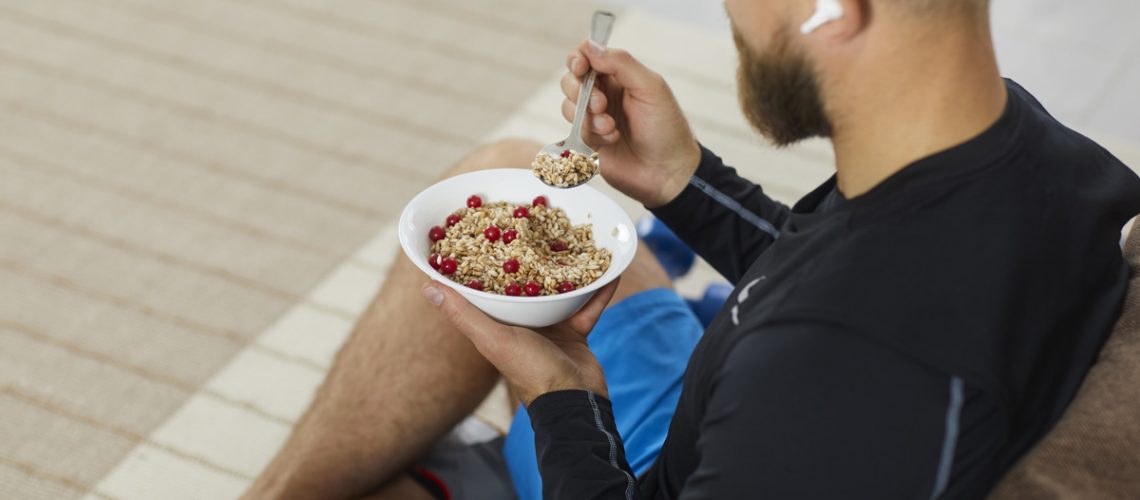The goals of post-exercise nutrition are to restore and promote training adaptations.
After exercise, catabolic processes – state of breaking down- dominate, such as an increased muscle protein breakdown (MPB), and muscle glycogen may be at low or depleted levels.
Consuming carbohydrates and protein after training can shift the body to an anabolic state (building back up). If available carbohydrates (glucose) and muscle glycogen are substantially depleted, glycogen synthesis is activated, and insulin sensitivity increases, enhancing glucose and amino acid uptake into the muscle. This unfolding presents an opportunity to restore muscle glycogen and reduce muscle protein breakdown.
Muscle Glycogen Restoration Recommendations
The amount of carbohydrate consumed directly and positively affects the post-exercise glycogen storage following exercise. If carbohydrates get ingested immediately post-exercise, the rate of glycogen synthesis can be accelerated.
The recommendations for optimizing or achieving glycogen restoration is consuming 1.0-1.5 g of carbohydrate per kilogram of body weight per hour within the first two hours and should continue for 4 to 6 hours after exercise. Ivy and colleagues demonstrated that a two-hour delay, compared to immediate ingestion, in carbohydrate feeding resulted in 45% lower muscle glycogen concentration 4 hours later. This conclusion is especially important when rapid restoration of glycogen is required, such as when there are less than eight hours between training sessions or competitive events.
Additionally, carbohydrate intake post-exercise can decrease muscle protein breakdown and inflammation, and restore immune function after high-intensity or strenuous exercise.

Food choices for muscle glycogen restoration should include carbohydrate-rich, high glycemic index (GI) carbohydrate and meals to maximize muscle glycogen storage. Inclusion of foods such as grains and grain products like bread, rolls, tortillas, bagels, pasta, rice, noodles, quinoa, and potatoes, legumes, beans, and fruits and think to combine into options such as parfaits, smoothies, and “power” bowls. If you experience GI discomfort, fullness, or time is limited, it’s recommended you consume carbohydrate beverages (ex, gels, bars, shakes).
Suppose you cannot consume <1.0 g of carbohydrate/kg/h during those first four hours. Consider co-ingestion with protein 0.3-0.4 g/kg with 0.8-1.0 g of carbohydrate/kg/h. The research concludes the paring of such increases muscle glycogen synthesis within 2 hours following exercise.
In addition to glycogen synthesis, protein plays a critical role in supporting muscle protein synthesis (MPS), and consuming protein post-exercise is crucial to reduce muscle breakdown and damage. The amount of protein needed to maximize MPS depends on the athlete and the type of exercise session, specifically resistance training. Generally, recommendations are between 0.3-0.4 g of protein/kg of body weight and rapidly-digesting, high-quality protein that contains sufficient essential amino acids.
Ultimately, post-exercise nutrition will depend on the type of exercise and its intensity, duration, and the time between bouts or sessions.
With increasing intensity and duration, carbohydrate needs will increase to sufficiently restore muscle glycogen, and the co-ingestion of protein will attenuate muscle breakdown and promote muscle repair. Depending on your training and competition schedule, nutrient timing post-exercise will vary in importance; however, there are drawbacks to timely nutrient intake. Doing so can only benefit by providing an opportunity to promote recovery and adaptations.
References
Betts, J.A. & Williams, C. (2010). Short-term recovery from prolonged exercise: exploring the potential protein ingestion to accumulate the benefits of carbohydrate supplements. Sports Medicine, Nov, 40(11), 941-59.
Burke, L.M., van Loon, L.J., & Hawley, J.A. (2017). Postexercise muscle glycogen resynthesis in humans. Journal of Applied Physiology, 122, 1055-1067.
Ivy, J.L., Katz, A.L., Cutler, C.L., Sherman, W.M., & Coyle, E.F. (1988). Muscle glycogen synthesis after exercise: effect of time of carbohydrate ingestion. Journal of Applied Physiology, Apr, 64(4), 1480-5.
Kerksick, C.M., Arent, S., Schoenfeld, B.J. et al. (2017). International society of sports nutrition position stand: nutrient timing. Journal of the International Society of Sports Nutrition, 14(33), doi: https://doi.org/10.1186/s12970-017-0189-4
Thomas, D.T., Erdman, K.A., Burke, L.M. (2016). American College of Sports Medicine Joint Position Statement: Nutrition and athletic performance. Medicine and Science, 48, 543-568.
